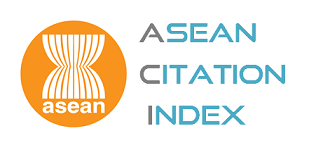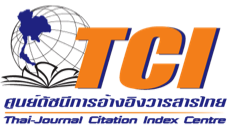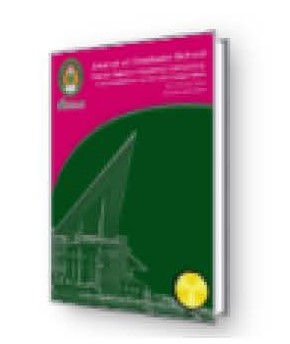การพัฒนาชุดฝึกทักษะการเรียนรู้ตามทฤษฎีคอนสตรัคติวิสต์ร่วมกับ เทคนิคการเรียนแบบร่วมมือ ที่ส่งผลต่อผลสัมฤทธิ์ทางการเรียน ความสามารถในการแก้ปัญหา และเจตคติต่อวิชาคณิตศาสตร์ ของนักเรียนชั้นมัธยมศึกษาปีที่ 3
Keywords:
The Skills Packages Constructivist Learning Theory with Cooperative Learning Techniques, Learning Achievements, Problem Solving Abilities, Attitudes toward Mathematics.Abstract
บทคัดย่อ
การวิจัยครั้งนี้มีความมุ่งหมาย เพื่อศึกษาดัชนีประสิทธิผลของชุดฝึกทักษะการเรียนรู้ตามทฤษฎีคอนสตรัคติวิสต์ร่วมกับเทคนิคการเรียนแบบร่วมมือ ของนักเรียนชั้นมัธยมศึกษาปีที่ 3 ที่ผู้วิจัยพัฒนาขึ้น เปรียบเทียบผลสัมฤทธิ์ทางการเรียนวิชาคณิตศาสตร์ ความสามารถในการแก้ปัญหา ระหว่างก่อนเรียนและหลังเรียนของนักเรียนที่เรียนด้วยชุดฝึกทักษะการเรียนรู้ตามทฤษฎีคอนสตรัคติวิสต์ร่วมกับเทคนิคการเรียนแบบร่วมมือ เปรียบเทียบเจตคติต่อวิชาคณิตศาสตร์ของนักเรียนชั้นมัธยมศึกษาปีที่ 3 หลังเรียนด้วยชุดฝึกทักษะการเรียนรู้ตามทฤษฎีคอนสตรัคติวิสต์ร่วมกับเทคนิคการเรียนแบบร่วมมือกับเกณฑ์ที่กำหนดไว้ และเปรียบเทียบผลสัมฤทธิ์ทางการเรียน ความสามารถในการแก้ปัญหา และเจตคติต่อวิชาคณิตศาสตร์ ของนักเรียนที่มีความสามารถทางการเรียนต่างกันหลังเรียนด้วยชุดฝึกทักษะการเรียนรู้ตามทฤษฎีคอนสตรัคติวิสต์ร่วมกับเทคนิคการเรียนแบบร่วมมือ กลุ่มตัวอย่างเป็นนักเรียนชั้นมัธยมศึกษาปีที่ 3 โรงเรียนบ้านเหล่าบ้านถ่อน สังกัดสำนักงานเขตพื้นที่การศึกษาประถมศึกษาสกลนคร เขต 2 ภาคเรียนที่ 2 ปีการศึกษา 2556 จำนวน 1 ห้องเรียน จำนวนนักเรียน 26 คน ซึ่งได้มาจากการสุ่มแบบกลุ่ม เครื่องมือที่ใช้ในการวิจัยประกอบด้วย 1) ชุดฝึกทักษะการเรียนรู้ตามทฤษฎีคอนสตรัคติวิสต์ร่วมกับเทคนิคการเรียนแบบร่วมมือ 2) แบบทดสอบวัดผลสัมฤทธิ์ทางการเรียน 3) แบบทดสอบวัดความสามารถในการแก้ปัญหา 4) แบบวัดเจตคติต่อวิชาคณิตศาสตร์ สถิติที่ใช้ในการวิเคราะห์ข้อมูล ได้แก่ ค่าเฉลี่ย ค่าร้อยละ ส่วนเบี่ยงเบนมาตรฐาน ค่าดัชนีประสิทธิผล สถิติทดสอบค่าทีการวิเคราะห์ความแปรปรวนร่วมพหุคูณแบบทางเดียว การวิเคราะห์ความแปรปรวนร่วม แบบทางเดียวและการวิเคราะห์ความแปรปรวนแบบทางเดียว
ผลการวิจัยสรุปได้ดังนี้
1. ชุดฝึกทักษะการเรียนรู้ตามทฤษฎีคอนสตรัคติวิสต์ร่วมกับเทคนิคการเรียนแบบร่วมมือ มีค่าดัชนีประสิทธิผล เท่ากับ 0.62
2. ผลสัมฤทธิ์ทางการเรียนของนักเรียนชั้นมัธยมศึกษาปีที่ 3 ที่ได้รับการเรียนด้วยชุดฝึกทักษะ การเรียนรู้ตามทฤษฎีคอนสตรัคติวิสต์ร่วมกับเทคนิคการเรียนแบบร่วมมือ หลังเรียนสูงกว่าก่อนเรียน อย่างมีนัยสำคัญทางสถิติที่ระดับ .05
3. ความสามารถในการแก้ปัญหาของนักเรียนชั้นมัธยมศึกษาปีที่ 3 ที่เรียนด้วยชุดฝึกทักษะการเรียนรู้ตามทฤษฎีคอนสตรัคติวิสต์ร่วมกับเทคนิคการเรียนแบบร่วมมือ หลังเรียนสูงกว่าก่อนเรียน อย่างมีนัยสำคัญทางสถิติที่ระดับ .05
4. เจตคติต่อวิชาคณิตศาสตร์ของนักเรียนชั้นมัธยมศึกษาปีที่ 3 ที่ได้รับการเรียนด้วยชุดฝึกทักษะการเรียนรู้ตามทฤษฎีคอนสตรัคติวิสต์ร่วมกับเทคนิคการเรียนแบบร่วมมือ อยู่ในระดับมากขึ้นไป อย่างมีนัยสำคัญทางสถิติที่ระดับ .05
5. ผลสัมฤทธิ์ทางการเรียนและความสามารถในการแก้ปัญหาของนักเรียนที่มีความสามารถทางการเรียนต่างกัน เมื่อได้รับการเรียนรู้ด้วยชุดฝึกทักษะการเรียนรู้ตามทฤษฎีคอนสตรัคติวิสต์ร่วมกับเทคนิคการเรียนแบบร่วมมือ มีความแตกต่างกัน อย่างมีนัยสำคัญทางสถิติที่ระดับ .05
6. เจตคติต่อวิชาคณิตศาสตร์ นักเรียนที่มีความสามารถทางการเรียนต่างกัน เมื่อได้รับการเรียนรู้ด้วยชุดฝึกทักษะการเรียนรู้ตามทฤษฎีคอนสตรัคติวิสต์ร่วมกับเทคนิคการเรียนแบบร่วมมือ ไม่แตกต่างกัน
ABSTRACT
This study aimed 1) to study the Effectiveness Index of the developed learning skills packages based on constructivist learning theory with cooperative learning technique of Mathayom Suksa 3 students, 2) to compare learning achievements, problem solving abilities between before and after learning of the students with the developed learning skills packages based on constructivist learning theory with cooperative learning technique, and 3) to compare attitudes toward mathematics of Mathayom Suksa 3 students after learning through the developed learning skills packages based on constructivist learning theory with cooperative learning technique, according to the criteria defined, and compare the learning achievements, problem solving abilities and attitudes toward mathematics of the students with different learning abilities after learning through the developed learning skills packages based on constructivist learning theory with cooperative learning technique. The samples used in this study consisted of 26 students of Mathayom Suksa 3, from one class, in the second semester of academic year 2013 at Banlaobanthon School under the Office of Sakon Nakhon Primary Educational Service Area 2, through Cluster Random Sampling. The instruments used were composed of: 1) the developed learning skills packages based on constructivist learning theory with cooperative learning technique, 2) a learning achievement test, 3) a test of the abilities to solve problem, and 4) the questionnaire to measure the students' attitudes toward mathematics. The data were statistically analyzed using mean, percentage, standard deviation, Effectiveness Index (Effectiveness Index: E.I.), t-test (Dependent Samples), t-test (One Samples), One-way MANCOVA, One-way ANCOVA and One-way ANOVA.
The findings of this study were as follows :
1. The Effectiveness Index of the developed learning skills packages based on constructivist learning theory with cooperative learning technique was 0.70.
2. The learning achievements of the students in Mathayom Suksa 3 after learning with the developed learning skills packages based on constructivist learning theory with cooperative learning technique were higher than before learning at the .05 level of significance.
3. The problem solving abilities of the students in Mathayom Suksa 3 after learning with the developed learning skills packages based on constructivist learning theory with cooperative learning technique were higher than before learning at the . 05 level of significance.
4. There was a higher significant difference in the attitudes toward mathematics of Mathayom Suksa 3 students learning with the developed learning skills packages based on constructivist learning theory with cooperative learning techniquesat the .05 level.
5. The learning achievements and problem solving students of the abilities with different learning achievements after learning with the developed learning skills packages based on constructivist learning theory with cooperative learning technique were significantly different at the .05 level.
6. The students with different learning abilities when learning with the developed learning skills packages based on constructivist learning theory with cooperative learning technique had no different attitudes toward mathematics.
Downloads
Published
How to Cite
Issue
Section
License
บทความทุกบทความที่ตีพิมพ์ในวารสารบัณฑิตศึกษา มหาวิทยาลัยราชภัฏสกลนคร ถือว่าเป็นลิขสิทธิ์ของบัณฑิตวิทยาลัย มหาวิทยาลัยราชภัฏสกลนคร









